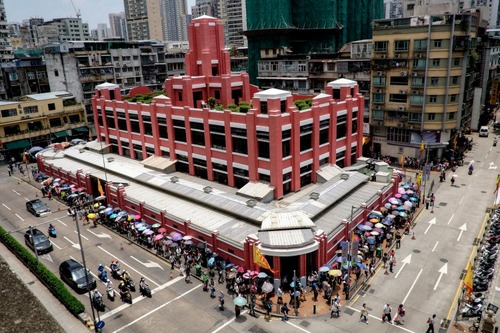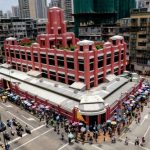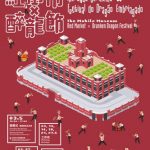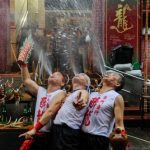 Red Market
Red Market
In response to this year’s International Museum Day, 17 Macao museums co-organize a large-scale annual museum event, the “2017 Macao International Museum Day Carnival” themed “The Mobile Museum – Red MarketX Drunken Dragon Festival”. The opening ceremony will be held on 3 May, at 10:30am, at the Red Market (Mercado Municipal Almirante Lacerda). Representatives of cultural entities from Guangdong Province and of the Hong Kong Home Affairs Bureau and its respective museums were invited to participate in the ceremony. The general public is welcome to attend the ceremony.
The “Feast of the Drunken Dragon” is a unique traditional folk festivity and was inscribed in the Macao Intangible Cultural Heritage List in 2009 and in the National Intangible Cultural Heritage List in 2011, respectively. In turn, the Red Market is inscribed in the Macao Cultural Heritage List as a building with architectural value. In this edition of the Macao International Museum Day Carnival, several of Macao’s museums, in collaboration with the Macao Fishmongers Association (Ou Mun Sin U Hong Chong Wui), combine the traditions of the Drunken Dragon Dance and the “Dragon Boat rice” distribution with the activities of the International Museum Day Carnival. On the one hand, traditional ceremonies will be held by the Macao Fishmongers Association, such as offerings to the gods, drunken dragon and lion dance performances, parades through the streets of Macao and distribution of “Dragon Boat rice”; on the other hand, the Red Market will be transformed into “The Mobile Museum” by Macao’s museums, featuring an array of excellent activities, including an exhibition about Dragon Boat rice cuisine and the history of Macao’s street vendors with the models of street hawkers’ stalls displayed on-site; as well as a series of thematic workshops including a perler beads workshop; a cyanotype workshop - creative postcard; a workshop of painting dragon boat collages; a workshop of fan painting about the Drunken Dragon Dance; The Drunken Dragon Dance - Lego building and hand painting parent-child workshop; and Red Market - Drunken Dragon Dance key ring engraving. Furthermore, guided tours dedicated to “The History and Evolution of the Red Market”, three lectures about Dragon Boat Rice, the Red Market and street vendors and the community to be held successively at the Lung Wah Tea House, as well as the printing of commemorative T-shirts and wine tasting, among other activities will be available. All residents are welcome to participate.
This year’s 2017 Macao International Museum Day Carnival is jointly organized by the Nature and Agrarian Museum, the Grand Prix Museum, the Tung Sing Tong Historical Archive Exhibition Hall, the Heritage Exhibition of a Traditional Pawnshop Business, the Fire Services Museum, the Maritime Museum, the Communications Museum, the Museum of Taipa and Coloane History, the Handover Gifts Museum of Macao, the Lin Zexu Memorial Museum of Macao, the Macao Science Center, the Macao Tea Culture House, the Dr. Sun Yat Sen Memorial House in Macao, the Macao Museum, the Macao Museum of Art, the Wine Museum and the Taipa Houses; and is co-organised bythe Macao Fishmongers Association (Ou Mun Sin U Hong Chong Wui) and Macao Street Vendors Mutual Aid Association (Ou Mun Si Fan Vu Chó Vui).
In May, each museum will organize other celebrations, exhibitions, workshops, lectures and free admission days. For more information, please visit the Macao Museum’s webpage at www.museums.gov.mo, or follow the Cultural Affairs Bureau or the Macao Government Tourism Office’s WeChat accounts or call through tel. no. 8988 4115 during office hours.
View gallery



